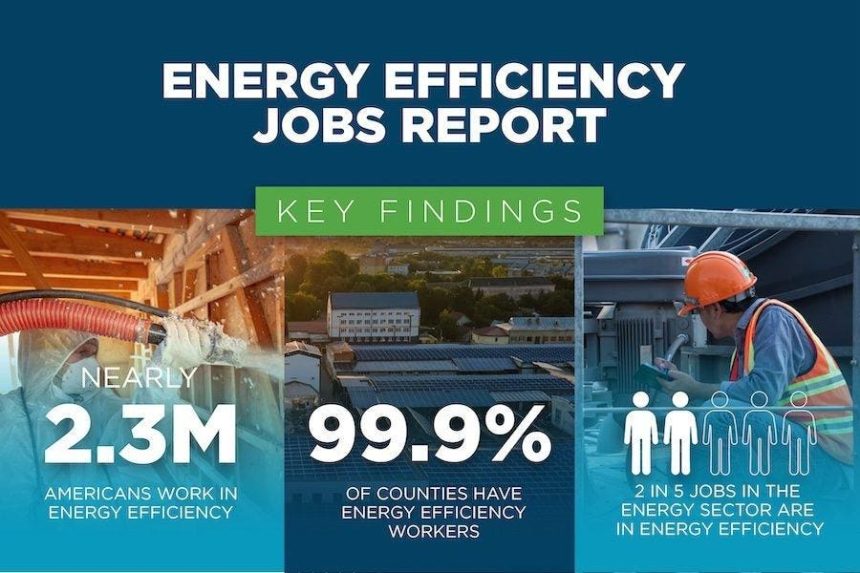The global push for carbon emission reduction is a two-pronged imperative driven by climate change mitigation and economic stability. Inefficient energy consumption, a significant contributor to both issues, is a pervasive problem. In the United States, the average household squanders 30% of its energy consumption, resulting in an unnecessary $60 monthly surcharge on utility bills. This inefficiency is further amplified by the nation’s disproportionate energy consumption: with only 4% of the global population, the U.S. devours a staggering 16% of the world’s energy. Addressing this energy inefficiency is not a partisan issue but a universal concern that transcends political, social, and cultural boundaries. The energy efficiency industry, a long-standing sector, has assumed a critical role in mitigating these challenges by promoting energy conservation and cost savings for homes and businesses. However, a significant workforce shortage hampers the industry’s ability to effectively address these pressing needs. Joining this sector offers not only career opportunities but also the chance to contribute to a more sustainable and economically secure future for all. The call for skilled workers in this field is a call to action for individuals from diverse backgrounds to contribute to this crucial mission.
The energy efficiency industry, according to the Building Performance Association (BPA), already employs a substantial workforce of nearly 2.3 million individuals, representing two out of every five jobs in the U.S. energy sector. Remarkably, this sector employs more than double the number of workers compared to the entire fossil fuel industry. This highlights the significant economic potential of energy efficiency, showcasing its capacity to generate employment opportunities while simultaneously addressing environmental concerns. The industry’s focus extends beyond mere energy and cost savings; it’s a powerful engine for job creation. With growing public concern over climate change and inflation, federal investments have been directed towards combating inefficient energy practices, particularly in buildings, which account for 40% of total U.S. energy consumption. This underscores the urgency of the situation, demanding a rapid influx of skilled workers into the energy efficiency sector. The industry offers a promising career path for individuals equipped with the right skills and training, enabling them to contribute meaningfully to a sustainable future.
The acute demand for skilled workers in the energy efficiency sector has spurred the development of numerous free or low-cost training programs. These initiatives aim to equip individuals with industry-recognized credentials, accelerating their entry into the workforce and enabling them to contribute to solving the energy efficiency crisis. These programs are a direct response to employers’ concerns regarding the lack of skilled applicants. The Department of Energy’s Better Buildings Initiative highlights the primary hiring challenge as a limited applicant pool coupled with insufficient skills and experience. Recognizing this gap, numerous reputable training programs have emerged to bridge the skills gap and meet the growing demand for qualified professionals. This demand is further fueled by consumer interest in energy efficiency, prompting state and federal funding for workforce development initiatives. These initiatives not only facilitate the entry of new workers into the industry but also provide “upskilling” opportunities for existing professionals to advance their careers and enhance their contributions.
The importance of energy efficiency extends far beyond climate change mitigation. It’s a powerful economic driver that creates a ripple effect of job creation throughout the economy. The American Council for an Energy-Efficient Economy (ACEEE) emphasizes the multifaceted job creation potential of this sector. It encompasses jobs in manufacturing, sales, and installation of energy-efficient products, construction of energy-efficient buildings, and provision of energy-saving services. Beyond direct employment, the industry supports ancillary jobs in supply chains and stimulates economic activity by reducing energy bills, freeing up consumer spending for other sectors. This emphasizes the holistic benefits of energy efficiency, demonstrating its capacity to simultaneously address environmental challenges and bolster economic prosperity.
The energy efficiency industry aligns perfectly with the American values of fuel choice and economic strength. It offers a diverse range of career paths and contributes significantly to economic health. Recognizing the broad benefits of this industry can encourage individuals to pursue rewarding careers within this sector, capitalizing on the abundant opportunities and strong economic foundation it provides. The path for those interested in joining this mission is straightforward: seek training and employment in the energy efficiency field. This is not merely a career choice; it’s a commitment to a crucial mission. Embarking on this path promises a long and prosperous career imbued with the satisfaction of making a tangible difference.
The energy efficiency sector stands as a beacon of opportunity for individuals seeking a meaningful and impactful career. It’s a field where professional growth and societal contribution intersect. By acquiring the necessary skills and joining this dynamic industry, individuals can be at the forefront of creating a more sustainable and prosperous future for all. The time to act is now, answering the call for skilled workers and contributing to a mission that benefits both the environment and the economy. This is not merely a job; it’s an investment in a better future.



